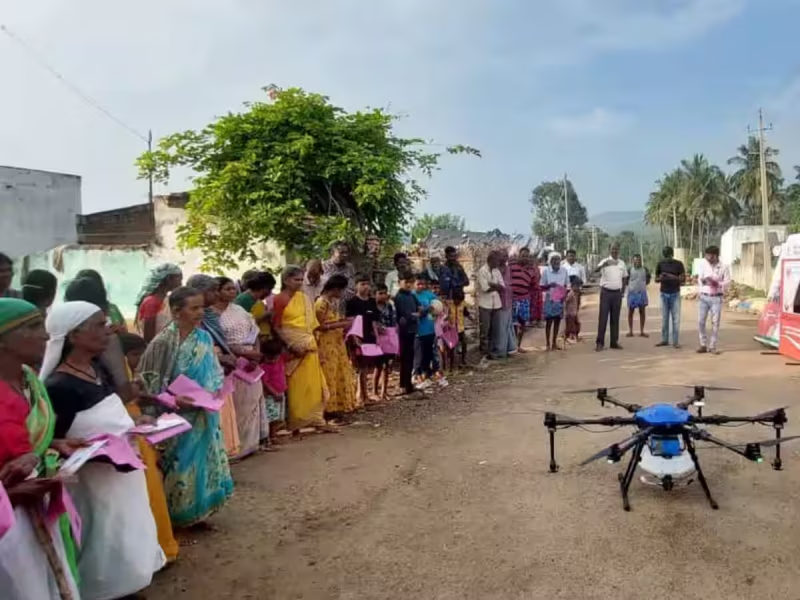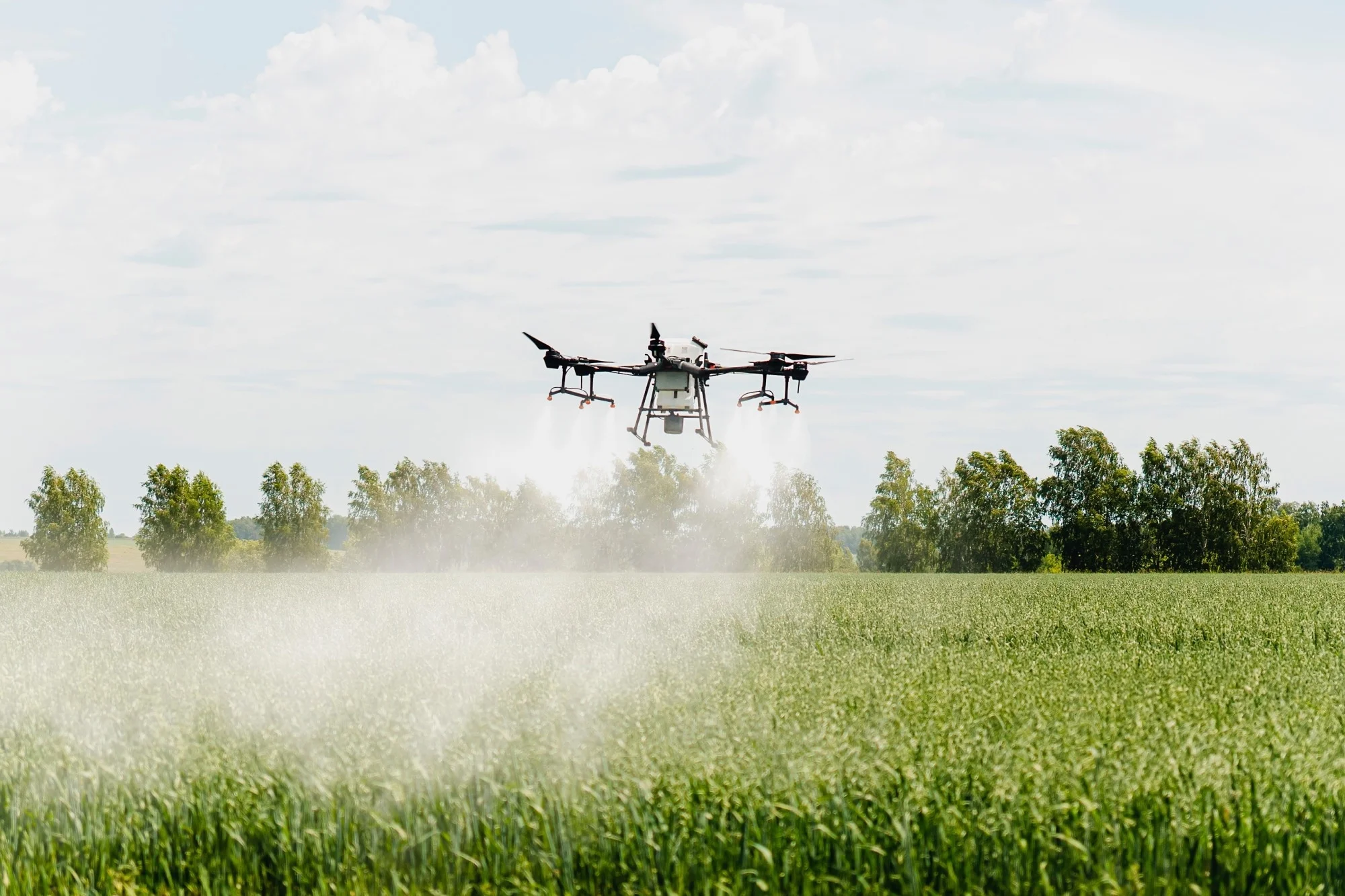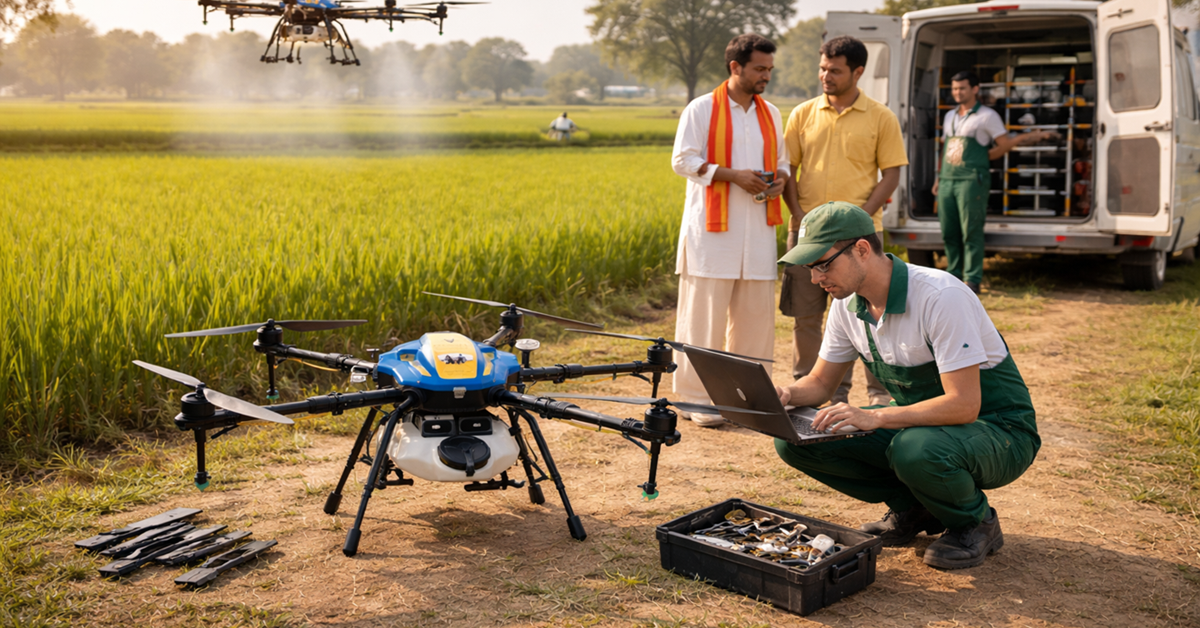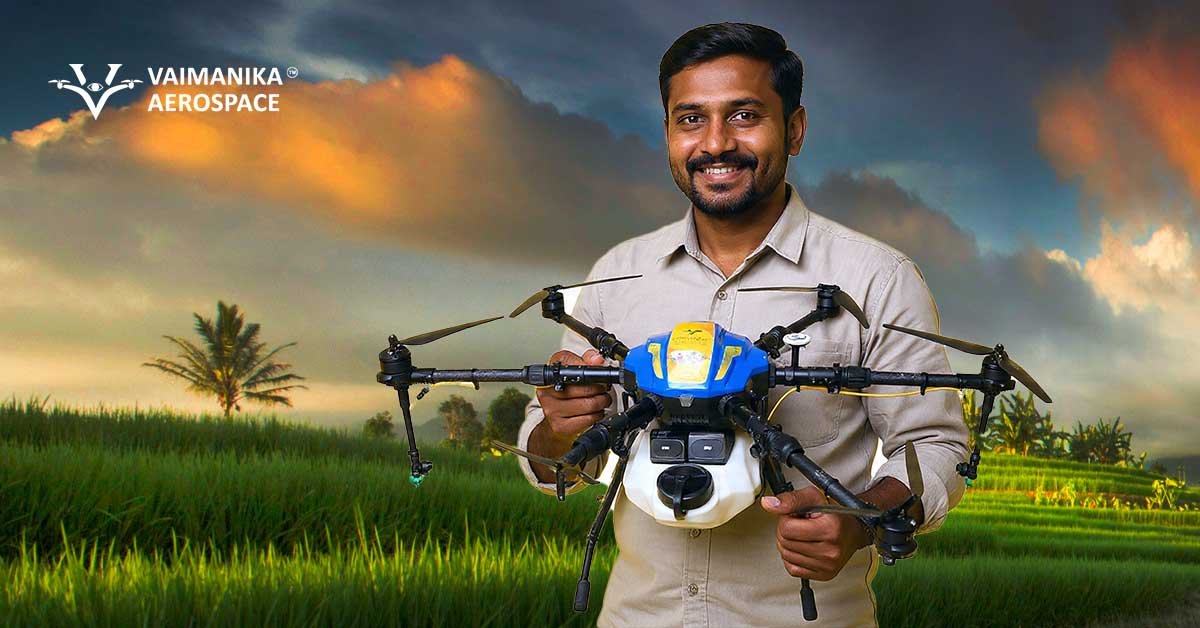India’s agricultural sector drives the economy. It reached $440.8 billion in 2024. Experts project a 10.5% CAGR through 2032. Drones now transform farming practices. Agri-drone franchises in Tier 2 and rural areas offer huge potential. Government support and local entrepreneurs fuel this growth. Vaimanika Aerospace leads the charge. They empower rural communities with advanced drones and scalable models.
The Rise of Drone Usage in Indian Agriculture
Drones change farming in India. They tackle labor shortages and inefficiency. With GPS, AI, and sensors, drones enable precision farming. They monitor crops and analyze soil. Drones also spray pesticides efficiently. As a result, farmers save up to 70% on resources. Crop yields rise by 30-35%. The drone market in India will hit $631.4 million by 2030. It grows at a 38.5% CAGR. Over 220 drone startups exist as of 2022. The fleet may reach 6-7 lakh drones by 2030-31. Thus, drones are essential for small farmers. These farmers own just 1.08 hectares on average.

Government Push: Subsidies and Namo Drone Didi Yojana
The government actively supports drone use. The Sub-Mission on Agricultural Mechanization (SMAM) gives 40-50% subsidies on drones. This can be up to ₹4-5 lakh. SC/ST and women farmers get extra support. Meanwhile, the Agriculture Infrastructure Fund (AIF) offers loans up to ₹2 crore. These loans have a 3% interest subsidy. Consequently, drones become affordable for farmers.
The Namo Drone Didi Yojana, launched in 2023, empowers rural women. It has a ₹1,261 crore budget. The scheme equips 15,000 women led SHGs with drones. They get an 80% subsidy, up to ₹8 lakh per SHG, from 2024-25 to 2025-26. Women train as pilots and technicians. They provide rental services like spraying nano fertilizers and monitoring crops. SHGs earn at least ₹1 lakh yearly. Some make ₹60,000 monthly. For example, Maharashtra’s 2024-25 budget funds 3,090 SHGs with drones. This creates a skilled women workforce. India aims for 80% drone adoption in farming within 5-7 years. Tractors took 20 years to reach that level.
Business Opportunities in Tier 2 and Rural Markets
Tier 2 cities and rural areas rely on agriculture. About 43% of India’s population farms. The population may hit 1.668 billion by 2050. Food demand will soar. Drones help solve labor shortages. They also cut rising input costs. Therefore, small farmers benefit greatly.
Franchises offering Drone as a Service (DaaS) thrive in these markets. They provide rental services via Custom Hiring Centers (CHCs). Farmers access drones without high costs. Drones cost ₹4-5 lakh to buy. In Tamil Nadu, Odisha, and Maharashtra, CHCs work well. Farmers book services for spraying pesticides and fertilizers. IFFCO plans to deploy 2,500 drones for nano fertilizers. Franchises can offer precision spraying and crop health mapping. Vaimanika Aerospace provides drones suited for India’s diverse conditions. Their drones ensure reliability for rural use.

Why Local Franchisees Are Key to Scaling
Local franchisees drive agri-drone growth in India. They understand regional farming needs. Franchisees also know crop patterns and community dynamics. Hence, they deliver tailored solutions. They bridge the gap between technology and farmers. Many farmers lack technical skills and awareness.
Vaimanika Aerospace partners with franchisees. They offer training, certified drones, and marketing support. Franchisees provide services like drone maintenance and pilot training. The Namo Drone Didi Yojana boosts this model. Women led SHGs become franchise operators. This builds trust and entrepreneurship. Additionally, franchisees tackle logistical issues. Poor internet and regulations often cause problems. Franchisees offer on ground support. They also use government training programs. By setting up CHCs and maintenance hubs, they keep drones running. Vaimanika Aerospace supplies DGCA certified drones. Their focus on indigenization aligns with India’s self-reliance goals.

Challenges and the Path Forward
Challenges still exist. High costs deter small farmers, even with subsidies. Poor rural connectivity causes issues. Regulations also create hurdles. However, the government helps. The Drone Rules 2021 ease restrictions. The Production Linked Incentive (PLI) scheme offers ₹120 crore for drone manufacturing.
Collaboration is vital. Vaimanika Aerospace works with universities and SHGs. They also partner with Krishi Vigyan Kendras. Together, they provide training and affordable solutions. Local franchisees help drones reach remote areas. As a result, they drive sustainable farming and growth.
Conclusion
Agri-drone franchises will transform rural business in India. They blend technology with economic growth. Government subsidies and the Namo Drone Didi Yojana provide support. Local franchisees play a key role. Vaimanika Aerospace leads this change. They offer advanced drones and franchise opportunities. Join us to revolutionize Indian agriculture with drones.
For franchise inquiries, contact Vaimanika Aerospace at +91 7677111150 / +91 9955111150.





